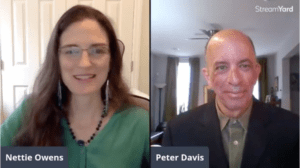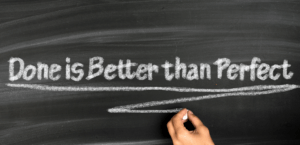Why is it important to take a holistic approach to become more efficient and effective?
Another word for holistic is comprehensive. And you can read books on different aspects of it. But when you step back and see how productivity really works, you’ll find that there are 12 sets of skills, knowledge, and ability – 12 factors – that influence how productive someone can be.
It’s not a personality traits kind of thing – it’s these skills, knowledge, and ability.
And what that means is, it could be anything from a boundary setting to communication to health. All of this can influence how productive someone can be at any given moment. And if you don’t look at the big picture, you can get stuck trying to fix things that aren’t really the problem.
So, I might have a client come to me and say, “I’m disorganized. I need to get my office in shape.” But when we drill down, we find that she never closes her office door. She is doing the work of some of her team members, or she is taking on too many commitments. And it turns out what’s going on is that boundary setting is the problem. And if we can work on that – sort of magically – the office starts to take care of itself.
I think productivity is producing the life that you want. And if you’re going to do that, do it the most efficient, fastest way you can. That means finding out what’s really going on, and the holistic approach lets you do that.
“Identifying the skills where you need clarity or support should not be seen as failure.”
When it comes to productivity, there are 12 factors that are all equally important and all interrelated.
They are:
- Boundary Setting
- Communication
- Relationships
- Delegation
- Decision-Making Drive – which is attitude
- Mindset
- Health
- Organization of Objects and Data
- Planning
- Reinvention
- Managing Change and Resources (internal and external)
- Task and Project Management
“On days when you are feeling less productive, can you go through this list and think about why that may be the case?”
What have you found to be an effective means of boosting productivity for everyone – no matter the industry?
I used to say nothing – that there’s not one thing you can do. But now I know that’s not true. And this is a practice that everybody can do starting today. And it will help you because it strengthens every single link in the chain.
And that is to practice mindfulness.
I think of mindfulness as paying attention deliberately, in the present moment, without opinion. So, it’s awareness of what you’re thinking, feeling, and physical sensations. But instead of having a judgment about them, such as that’s great, or that’s terrible, just be aware, because that gives you the detachment to choose how to act.
It strengthens focus. It improves your relationships with others. It helps your decision making,
“I like to recommend to my clients to be scientists. I’ve found that just pretending to be a scientist helps. Scientists look at all the data, and they are curious. They ask questions, and they don’t necessarily jump to conclusions – even if they have a hypothesis where the outcome really integrates well. Use mindfulness to bring awareness in an almost scientific way – that doesn’t include judgment.”
What’s the difference between coaching and productivity coaching – and what makes it so powerful and effective?
I believe 100% in self-help and self-growth.
I wrote a book in part so people could just read the book and just go on their own and do their own practice and experiments. But I think there’s something – which I know from personal experience – that’s really powerful about partnering with someone else, as a coach or as a thinking partner. You can reflect on what’s working and what’s not working.
With my clients, I’m giving them tools, tricks, ideas; that’s the consulting side. But with coaching, it’s helping them assimilate what’s going to work best, drawing on their inner wisdom, and building effective habits.
That’s so much of my role with clients – to learn from doing, finding out what works, and moving towards really becoming all the things you want to be and maybe thinking bigger about who they want to be – by letting go of these ideas and limits that they have.
The clients that I work with end up starting to think about themselves differently, too. And some of them say they can hear my voice in their head. But the part that I like about that is it’s the voice that’s telling them to pause, to maybe be more compassionate and objective towards themselves.
What they end up getting from productivity coaching is not just how to do things today, but it’s how to learn how to do things going forward.
Because I’ll give you tools now, but five years from now, there’s going to be some technology that we’ve never heard of, but you’ll know how to change and how to adapt things to yourself. That’s what productivity coaching does.
“Do you have a coach who acts as your “thinking partner”? A coach can help you reflect and clarify what’s working and not working for you – and help you move forward.”
3 Action Steps
1. Take a holistic look at your productivity, knowing that productivity is not a personality trait but a set of 12 skills, knowledge, and abilities.
2. Practice mindfulness as a means to stay in the moment without judgment.
3. Work with a productivity coach to get tools that will move you forward and help you change and adapt.
Connect with Casey Moore on LinkedIn or at Casey Moore Inc.
Please comment below. I would love to hear from you.














No comments yet.